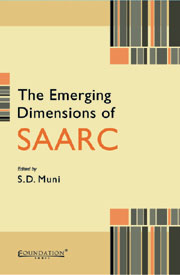Book contents
- Frontmatter
- Contents
- Preface
- List of Figures
- List of Tables
- 1 SAARC Prospects: The Changing Dimensions
- 2 SAARC and South Asian Economic Integration
- 3 Coping with the Emerging Challenges: Poverty and Food Security
- 4 SAARC Energy Cooperation: Energy Security and Environmental Challenges
- 5 Sub-Regional Cooperation under SAARC: An Economic Analysis
- 6 SAARC: Social Charter and Human Security
- 7 SAARC and the South Asian Security Architect
- 8 Fighting Terrorism through SAARC?
- 9 SAARC and the Evolving Asian Regionalism
- 10 Role of SAARC Observers: Members' Perspectives
- 11 Role of SAARC Observers: Observers' Perspectives
- 12 Concluding Remarks
- About the Contributors
- Index
6 - SAARC: Social Charter and Human Security
Published online by Cambridge University Press: 26 October 2011
- Frontmatter
- Contents
- Preface
- List of Figures
- List of Tables
- 1 SAARC Prospects: The Changing Dimensions
- 2 SAARC and South Asian Economic Integration
- 3 Coping with the Emerging Challenges: Poverty and Food Security
- 4 SAARC Energy Cooperation: Energy Security and Environmental Challenges
- 5 Sub-Regional Cooperation under SAARC: An Economic Analysis
- 6 SAARC: Social Charter and Human Security
- 7 SAARC and the South Asian Security Architect
- 8 Fighting Terrorism through SAARC?
- 9 SAARC and the Evolving Asian Regionalism
- 10 Role of SAARC Observers: Members' Perspectives
- 11 Role of SAARC Observers: Observers' Perspectives
- 12 Concluding Remarks
- About the Contributors
- Index
Summary
Introduction
The globalisation of the world economy has set in motion economic processes that conventional units of the international political order and the territorial states find a challenge. This challenge, they assume can be met better by entering into regional agreements with neighbours. However, the extent to which regional cooperation can be realised in practice depends on a host of security and political considerations. Even in the most advanced regional frameworks of integration such as the European Union (EU), national interests and security concerns remain paramount, and EU members are often unable to reach consensus on foreign threats and challenges. This was demonstrated most dramatically at the time of the first and second Gulf wars. Even in less challenging situations, EU member states continue to behave nationalistically while for all practical purposes, EU citizens can now settle down and work in any of the member states. Their economic integration is almost irreversible. With regard to social development, the EU adopted a Social Charter (in 1961 and revised in 1996) which upholds welfare rights of citizens and immigrants. It requires the signatures as well as ratification of EU members for full implementation. A mechanism for complaints has also been set up with the EU Secretary receiving such complaints in the first instance. Being mostly rich, industrial countries, the EU members have been able to achieve social development through internal economic growth and reform, but poorer members such as Greece, the Irish Republic and now the central and eastern European countries receive handsome economic help from a common fund.
- Type
- Chapter
- Information
- The Emerging Dimensions of SAARC , pp. 132 - 153Publisher: Foundation BooksPrint publication year: 2010



